In 15 seasons, Alan Knipe has led his alma mater Long Beach State to four Final Fours (2004, 2008, 2016 and 2017), one MPSF title and one MPSF Tournament crown.
That success has also included seven 20-win seasons and brought the program four national player of the year honors, including 2017’s AVCA recipient TJ DeFalco.
Thus far in 2018, the two-time national coach of the year has his 49er squad at 12-0 with just one set on the other side of the ledger.
To find out what has LBSU humming this season and how the 1992 alum has developed a culture of success, VolleyMob sat down with Coach Knipe ahead of the team’s weekend road trip to the East Coast to face Harvard and George Mason.
NOTE: The 49ers went 2-0 on the weekend, sweeping Harvard on Friday and GMU on Saturday, and are set to face No. 2 UCLA (13-1) Saturday and Wednesday.
Long Beach is home for you, having played from 1990-92 and coached there both as an assistant and head coach. What makes Long Beach special?
I think the common theme — whether it was from my playing days here or when I was an assistant coach or the head coach or when I took a leave to go to the national team and came back — has always been the people that work here, the people that support the athletic department, and the people on campus who make it feel much greater than just a job or a place to go to work. It is a place you feel loyalty to because there is a lot of loyalty to you. It is very much like family.
Does that make it an easy sell to potential players?
Absolutely. I think as a parent of a recruitable athlete you are looking for a lot of things when you are trying to find the right place for your son or daughter. Primarily you are looking for somewhere that is going to take care of your child in a lot of different ways. One of them would be hopefully mentoring, another would obviously be the right academic fit with the right academic support, and then, of course, the athletics fit. What are they going to take from the program? What kind of volleyball player are they going to be when they are done playing there? Also, what kind of culture are they to be part of when they are there because many of these are going to be lifelong relationships and friends that they are going to carry with them?
I think you just want them to be in a really healthy environment and the situation that I have here has given me the opportunity to create a wonderful team culture with obviously a lot of quality when it comes to the volleyball aspect of it. And more importantly, the alumni base, with our alumni involvement and the effect that our program has been able to have on a lot of the young men that have come through, shows that they feel the same as I did and that is very rewarding.
The success on the court has been there in the form of four Final Fours, an MPSF title (2001) and an MPSF tournament title (2017). Is there is a common thread to the teams you have had that have found success, especially the last couple of years?
You have to have very talented young men that are totally committed to something greater than themselves to achieve any of these things we have been able to achieve. I think it is also the type of kid and the type of families we have in our program, and also having an amazing staff around me who allow our student-athletes to have the very best experience possible. This is not a one-man show by any means. You have to have people helping you out and I have a great staff. I have lots of former players on my staff, which continues to build even more of that team culture, that identity of who we are and our loyalty and passion for playing and passing things along here at Long Beach State.
You have returning All-Americans in junior outside TJ DeFalco, junior setter Josh Tuaniga and junior opposite Kyle Ensing. When you look at their careers so far, do you still see that hunger that something is missing that they haven’t yet achieved?
The greatest part about this group is that whether we had won the NCAA finals game last year or the year before or if we came short of the Final Four, whatever the finish might be, I think the plans and the goals and the expectations that these guys have is so much greater than one thing. I don’t think it would change their approach to the gym one way or the other. They come in, they are committed to being better than they were last year, last semester, last month, last week, yesterday, last game… I think that is part of the culture we have been able to create of constantly trying to find ways to make consistent and continual improvement. That starts off by identifying different areas they want to get better at, small goals and big goals. By constantly talking with them and identifying these areas, we can really break it down into sustainable goals and really something that they can achieve on a daily basis and a weekly basis and actually see improvement. They have done such a good job of that that I think they are in such a good pattern right now. The No. 1 thing for them is making sure they are getting better individually and we are getting better collectively. I am just proud of their maturity and their mindset.
In 2017, you went 16-0 at home, won the MPSF tournament title and went on to the Final Four. Do you put that in the past and look at it as a whole new team this year?
You have seven starters on a team, and yes, we return TJ, Josh and Kyle, but we replace all four other starters and there were some really talented players in there with Amir (Lugo-Rodriguez), Bryce (Yould), (Andrew) Sato and Andrew Witt. That was a lot of talent for us and guys that had been in our program for a long time that understood our system, our way of doing things and more importantly the mindset and work ethic that our guys put in.
So yes, there is a sit down to say that this is a new team, but there is also a lot to build off of. There is a lot of good, a lot of things that we liked about it and we want to highlight those. But, at the same time, we have to set some goals. We have to try to be on two tracks – we have to fast track the learning curve for the guys who haven’t been out there as much, but at the same time, we have to find a way to make sure that the guys who have played a lot are getting better. That is a very difficult thing to do – to fast track experience is really difficult. It takes a lot of effort, not only from the inexperienced guys on the court, but it takes a lot of effort and patience and maturity from the guys that have been on the court to understand that they have been in those shoes before. The best thing they can possibly do is lead by example of what they want it to look like on a daily basis and be great with their communication with their teammates with the things they know and the things they want to do.
We have talked about it. We have set new goals and we take a new course this year. That is the wonderful thing about collegiate sports. The course sounds very similar, but it is never the same two years in a row. It is not a professional team, for the most part, you are not bringing back the same guys year in and year out. Even if your starters look the same, half your gym could have changed, so it is always a different journey.
Being 10-0 to start out still has to feel good, especially with the opponents you have played. And you have only dropped one set in that span. How do you assess their performance thus far, knowing they still have a long way to go?
I don’t get too caught up in the sets and things like that. In reality, it doesn’t make any difference in our sport. We don’t get any extra points for winning in three or winning in five. You want to win. I think the most important thing the set thing says is that we have been able to keep a consistent level of the way we have been playing. But there is so much more we have to get better at before we start conference, which is everything for us.
We have this trip coming up this week, so today we will get back in the gym and get started with our routine that we do every week and we will prepare for Harvard and George Mason, which is the most important part of our schedule right now, because that is where we are in our schedule right now. As far as our non-conference matches coming up and even the Big West, we have to be mature enough when we are training to understand that we have to get better for this week. We have to plan for this week, but there also some things on our big list that we have to check off, so we feel like we are also improving for the remaining non-conference matches and also to kick off the conference. We don’t want to look like the same team we were on Friday night when we play this week. And we don’t want to look like the same team we were this week, when we get another chance next week. And then we want to be a significantly better team when we play our first conference match.
That has been the methodical, routine oriented, attention to detail approach we take to each week. We don’t change the way we go through the week. The things that we do with the guys, the focus on different areas might change, but we want our guys to be in a really good routine, to be totally invested, leave the last week behind and be present in where we are at the moment.
Do you worry about overlooking opponents with big matches looming ahead?
I know that we will challenge our guys to stay in the moment. We always talk about respecting our opponents, respecting the game itself and also respecting the logo in the way we play the game. If we are accomplishing our own goals of taking care of those three things, in reality there is no way that we can overlook our opponent. There is no way we would let that happen because of the respect that we have for both programs. That is just not part of who we are. We are going to get back in the gym and worry about ourselves first and go back to our list of goals and make sure we are checking things off during the week to feel better about ourselves as a program.
Your roster features 12 upperclassmen and five seniors. Is that maturity what stands out when you look at your team?
Volleyball played at this level takes an incredibly high volleyball IQ, an attention to detail and a commitment to wanting to be fully committed and all in. It is hard to say you want to be all in or you are all in and totally committed as a freshman. I am not saying they don’t try as hard as they can, but it takes a little bit of time to figure out, to play back to back matches or go on a road trip, or whatever the different peaks and valleys of a collegiate season might be. The maturity comes in that you have pretty much played in every gym, you have played against every team, you have played in every situation for the most part. You have played in big games and road games and playoff games and championship games, and dealt with a lot of media. And the more things you get to experience, the more that experience becomes your norm. It is no longer something you put too much effort into planning for or not enough. You become very comfortable repeating preparation, repeating execution, keeping your emotions in check and focusing on the things you can control. So there is no doubt that experience is a great thing. That is a big part of our team: for the guys who have experienced those things to continue to show by their example, but more importantly, to share their experiences with our younger guys.
With five players averaging nearly 2.00 kills per set, hitting .415 as a team. What has the ability to spread the ball around and depth meant for your team?
I think the easy thing to do when you are starting out a season would be to set TJ and Kyle every ball. That would be ok and we would probably have some pretty good successes with that, but that is not what we want. We want to have balance in our offense and we can’t just use that as a buzz word. We really want to try to build it in practice and look for it in our own distribution statistics of our team to make sure we are balanced. We are making sure that we are doing that all week in practice and making sure that we are setting our guys in big moments in games, that we end up balanced at the end of matches.
To build that confidence in all of our players is to show them that in big moments we are not just going to go to TJ and Kyle in every situation. The more that we do it, the more success they feel and confidence they see in themselves and the better they start to play. TJ takes a ton of pride in other guys on our team getting kills because we know it is going to put a ton of stress on our opponents. It will make him better in the long run and also is a product of his passing. There are a lot of important pieces. In reality, it all comes back to the belief of our team in our system and the belief in our setters to run the type of offense we are trying to run and not give in to the easy temptation of just setting one guy or two.
Everyone knows Kyle, TJ and Josh, but who is not getting all of the spotlight or glory that is making a big difference on your team?
I think that is always the underlying story of our program. In years prior we had lost Taylor Gregory, one of our middle blockers, who had led the country in blocking. Who was going to replace him? And then Amir Lugo-Rodriquez who stepped in for two years and replaced him and led the country in blocking. And then we had Bryce Yould, who was an undersized middle who hit for a scary high number last year, and everybody’s comment was how do you replace that? And now we have Nick Amado, who is starting for us and doing a great job. Our freshman Simon Anderson also is doing a good job.
Last year, the big question was who was going to be in our outside hitting spot, and Andrew Witt had a phenomenal year as a fifth year senior, who hadn’t had a lot of starts in his career. He stepped in and did a great job. And this year, Bjarne Huus is doing the same thing as a senior. Or Andrew Sato, leaving after four years as starting libero, and Jordan Molina and Matt Butler doing such a good job this year.
We take a lot of pride that guys are working hard and are prepared to step in and upgrade us if we need it during the season. And, if it goes well and they are not the starter, they are prepared to step in and continue to keep our team playing at a high level and doing their job.
I think this year besides the starters that everyone has seen, Carlos Rivera is doing a wonderful job in our gym as a freshman setter. I think Louis Richard is having a really nice year as an outside hitter for us. Davis Cannon, one of the best opposites in the country, just happens to be behind Kyle, which is a tough spot to be in. I think of Matt Butler, who is sharing some time with Jordan Molina at libero. Zach Gates and Jason Willahan, two senior middle blockers, give us depth and the opportunity to have all of their experiences in our gym.
I think there are a lot of guys. It is a wonderful gym to be a part of every day.
Josh Tauniga and Kyle Ensing got experience with the U.S. Men’s National team this summer at the U21 World Championships and TJ DeFalco saw action in FIVB World League play. Having coached the national team, do you see a future for those guys on that level?
I think there are quite a few guys that have the ability to get into Anaheim and show what they can do. There are a lot of factors that go into what it will turn into when you get there. Sometimes there is a lot of depth at your position and sometimes there is not, so you get a quicker opportunity to get out there. Sometimes there is a lot of depth and you have to be patient and you have to show that you can be a role player for the first time in your life instead of the All-American.
TJ has already shown he can play on that stage and that doesn’t surprise me at all. So has Kyle Ensing to a certain degree. Physicality wise and talent wise there is no doubt that Kyle is going to be able to do that. He can play on the left, he can play on the right, he can hit out of the back row. He has great jump serve, he can pass in serve receive. He can absolutely fly. He is big and he can block. He is a guy who is going to get in the national team gym and they are going to realize there are a lot of ways they can use him.
And then Josh has spent some time with them as well. I think with Josh, when you watch him play there is no doubt that the thing that sets him apart is his location, his hands, his comfort level of making all sorts of different sets. Those are things that are easy to see. He is also a good blocker, a left handed attacker and he plays good defense. He is an unbelievably great student of the game and an amazing teammate. The type of teammate that he is is so infectious to his team. I don’t mean to downplay his talent level, but maybe the most important part of Josh is what he does for a team culture in making that team better, tighter and more cohesive on and off the court. I think you just have to have him in your gym for a while to see all of the things he can do for your program and to really appreciate him.
TJ got his 1,000th career kill a few weeks ago. Is that a product of the system or do you still see it as quite an accomplishment for him and a testament to how good he is?
It would be a complete slap in the face to TJ to say it is only a product of the system. I think the system that we run and him being an outside hitter gives him lots of opportunities to swing at the ball, but you still have to kill it and he has a million different shots he can use to kill a ball. It is special. It is not nearly where he wants to end, but it is special and you have to step back and admire that. You also have step back when you get 1000 kills and you are hitting about .400 as an outside hitter in your career, to note that you are not only killing the ball, but you are doing it an incredibly high rate. We could have a player get to 1000 kills because we set him 50 times a night. Just because he gets there doesn’t mean he is getting there very efficiently.
TJ is getting there and getting there very efficiently and he is doing it with his teammates having a lot of success around him, which makes me very proud. As TJ’s career go on, he is going to continue to check off some of these fun milestones along the way and it is all very much deserved.
And finally, give us your thoughts on the newly formed Big West.
I couldn’t be happier than having the Big West take on men’s volleyball. It is something that all coaches coming through the Big West have been wanting and pushing for for years now. I think it is simply one of the best things that has ever happened to our sport, if not the best thing. We have representation now from the Big West Conference to the NCAA. We now have a voice through the conference instead of through our various affiliations at each institution, which was a difficult task. I think with (commissioner) Dennis Farrell and the Big West taking the lead, we have already seen the benefit of it. We have another spot in the tournament because of the growth of the Big West. I think from a publicity standpoint it is going to big for men’s volleyball across the country. I think for what they are going to do with Big West TV and the championship, it can only help. The hope is that there are some other conferences out there that see what the Big West is doing and they are going to want that for themselves and we are going to see even more growth than we are right now.
It is exciting. It is also great for our sport, because it reduces the total number of matches the West Coast teams play within their conferences. Just a few years ago, we played 22 MPSF matches, last year we played 18. This year we are going to play 10 Big West matches. That is why our schedule looks the way it does and we are going to Harvard and George Mason and we have already been to Lewis and Loyola. This cross regional conference scheduling that is happening is great for our sport and it is also great for the teams within our conference. There were times in the past we were playing a team four times in a year. That can be good, but at the same time, it is not great for the growth of our sport. You also have teams from the Midwest and the East that were trying to get out and play us and we didn’t have any available dates or weekends, they were forced into the same idea with playing the same teams week in and week out, year in and year out.
I really like where it is going and I hope it continues to push other universities to add, and push conferences to add as an entire conference and we continue to be able to move the mark higher and higher. As a group of players and coaches and administrators and presidents and everyone who is involved with this thing, we feel like we want to leave our sport significantly better than we found it when we all came into this thing as leaders in our own different ways. We want it to better than when we played and better than when we were assistant coaches and better than we were started being head coaches. We want to leave a healthy sport behind us.
- Long Beach State coach Alan Knipe with Kyle Ensing
- Long Beach State men’s volleyball coach Alan Knipe talks to his team Courtesy: Long Beach State Athletics
- Long Beach State men’s volleyball timeout with coach Alan Knipe
- Long Beach State men’s volleyball coach Alan Knipe celebrates
- Long Beach State men’s volleyball huddle
- Long Beach State men’s volleyball coach Alan Knipe talks to senior outside hitter Bjarne Huus
- Long Beach State men’s volleyball celebration
- Long Beach State celebration
- Long Beach State men’s volleyball huddle
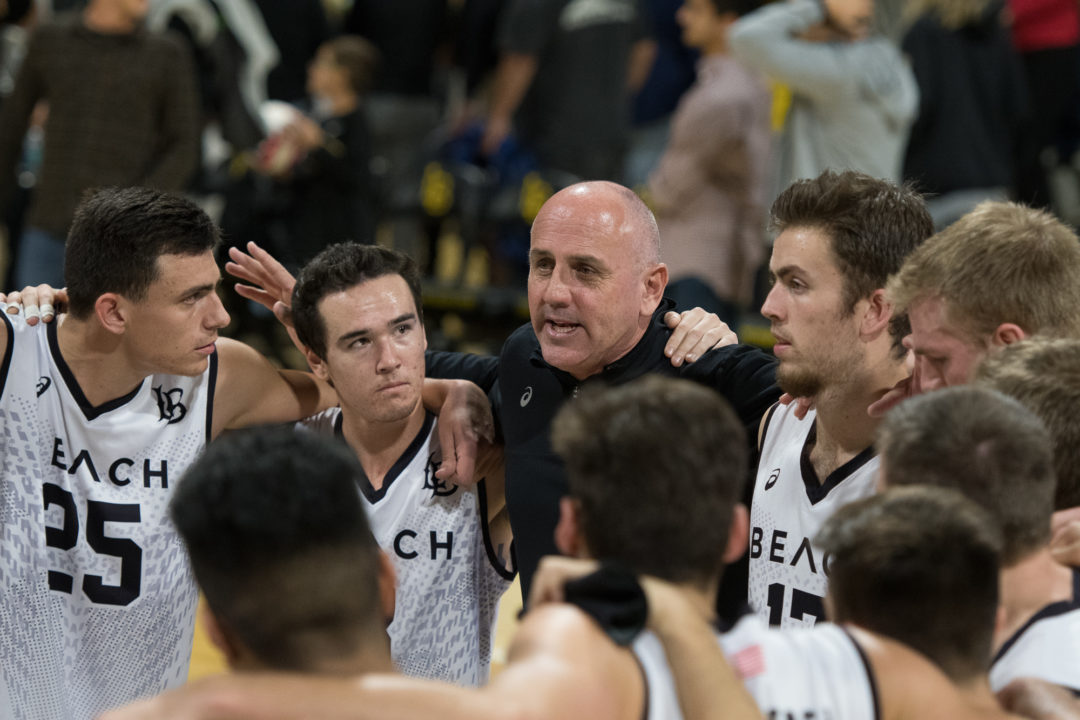
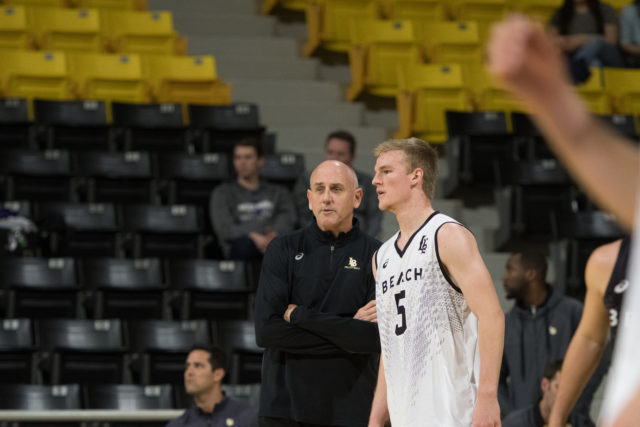
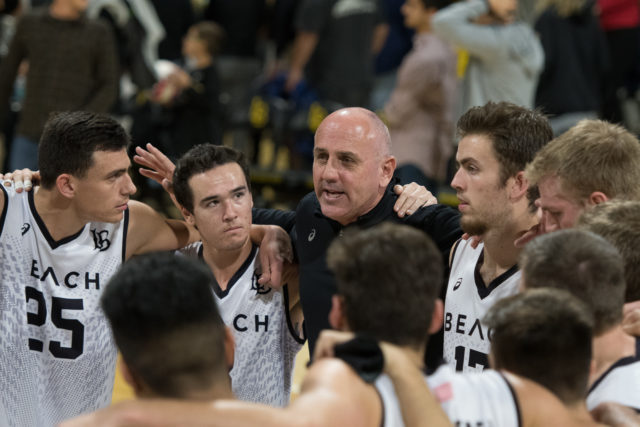
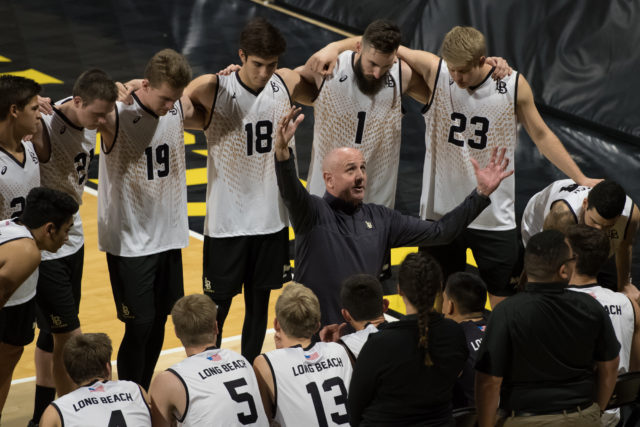
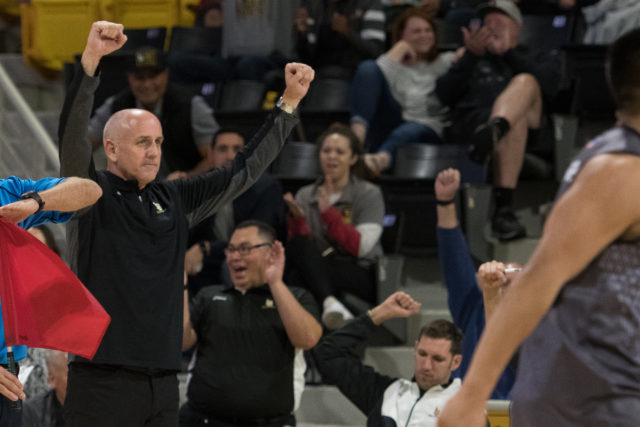
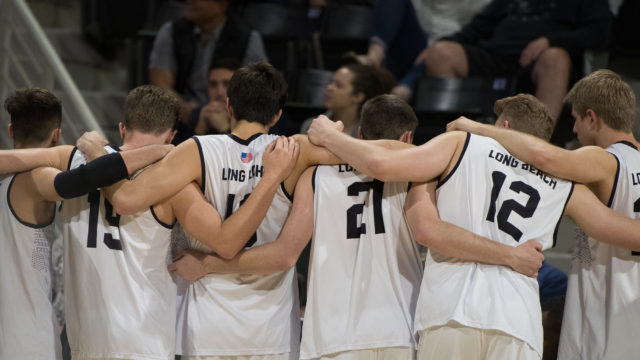
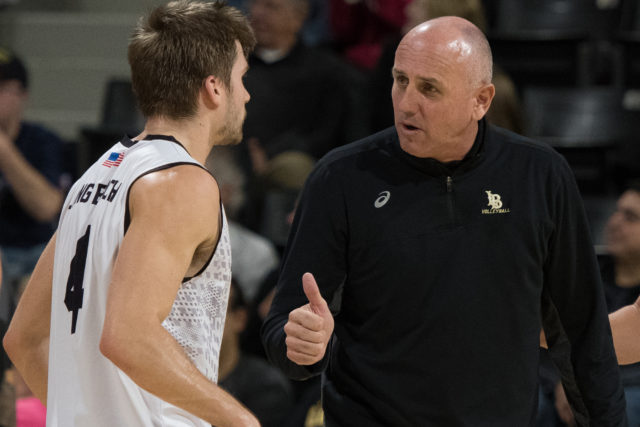
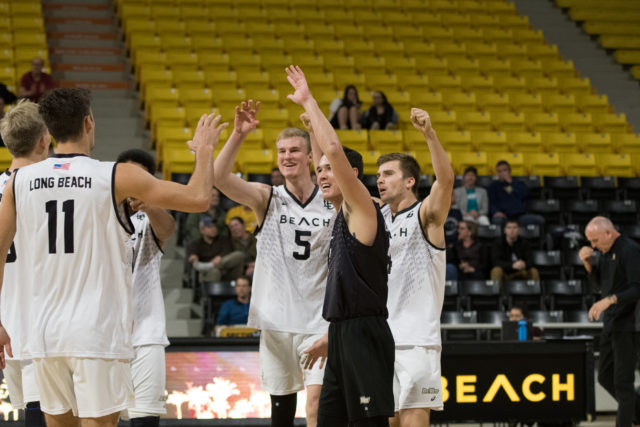
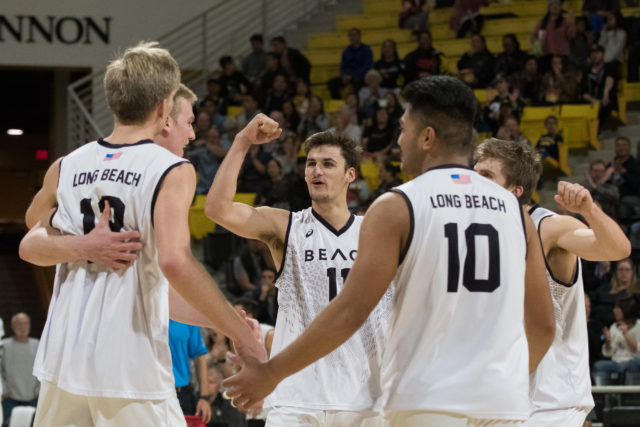
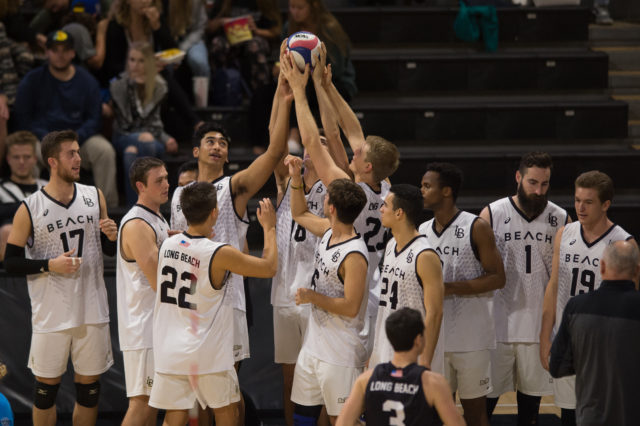
Leave a Reply